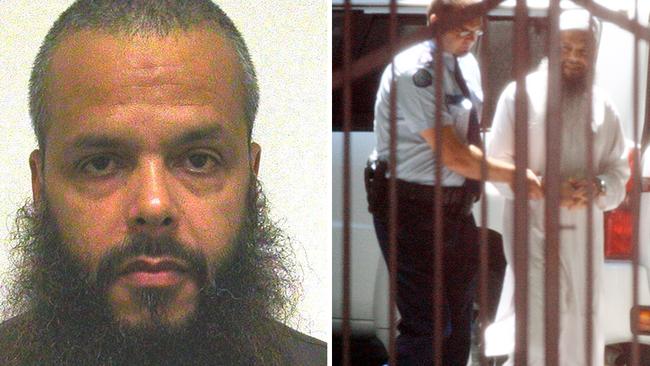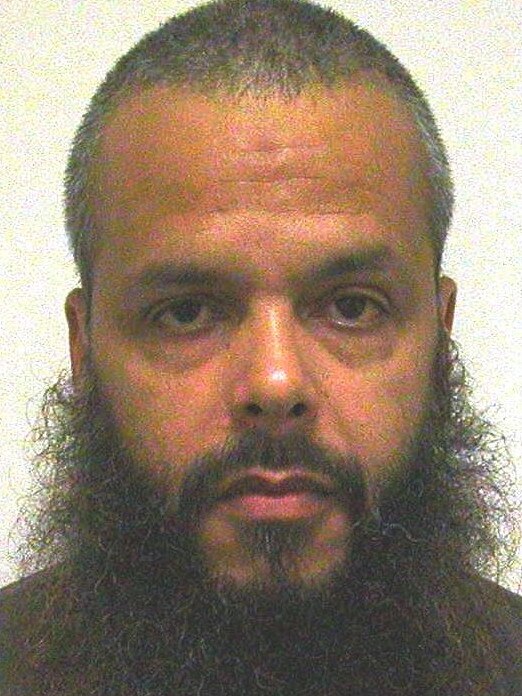Abdul Nacer Benbrika: A terrorist of influence
Abdul Nacer Benbrika is due for release this year ... and based on his ‘up-and-down performance’ in Barwon Prison, authorities have reason for concern.

His loyal followers were getting increasingly nervous.
Less than a month earlier, terrorists had carried out a series of attacks on London’s public transport system that killed 56 people.
In the days following the attack, he had told his “jemaah” that authorities would be “very, very sensitive” to the risk of an attack on Australian soil.
On August 5, 2005, the Algerian-born self-proclaimed sheik spoke in his usual calm and assured way about what would happen if his group got caught.
“Continue the jihad in jail, everywhere,” said Abdul Nacer Benbrika, the spiritual leader of a group of men based in Sydney and Melbourne who sparked what was at the time Australia’s biggest anti-terrorism investigation, Operation Pendennis.
READ MORE: Cops’ legal battle to keep terrorists locked up
And that is exactly what most of them have done since counter-terrorism officers made the first arrests in November 2005.
Several are now dead after travelling to Syria to fight for groups, including the Islamic State.
For years authorities have expressed their concerns about Benbrika’s ability — from jail — to influence others who have taken up his cause for jihad.
Fifteen years after his arrest, Benbrika is now one of 11 people convicted of terror-related charges who could be released from jail in the coming months.
GALLERY: Convicted terrorists who could soon be back on the streets
“He’s had an up-and-down performance, if I can put it that way, in Barwon Prison,” says the Australian National University’s Clarke Jones, an expert on radicalisation — particularly in prisons.
“At one point he was very much a loner, a bit of a loser, very much kept to himself. And then with the rise of Islamic State he became empowered again and managed to coerce a few people his way.
“What that means, I don’t know — whether they were assessed as radicalised or not. But he managed to develop a bit of support during his time.”

One of the senior Australian Federal Police investigators in the Pendennis investigation, speaking publicly about the case for the first time, says he would prefer to see Benbrika stay behind bars.
“My takeaway is that the country’s certainly safer while he’s incarcerated,” says the investigator, who is now retired. “I always thought there would be some further action taken against him on the finalisation of the case.”
It is a question authorities are now grappling with ahead of the completion of Benbrika’s sentence in November.
That problem also extends to 10 others who could apply for parole or have their sentence end this year — including former Osama bin Laden confidant Bilal Khazal, who produced a terror manual.
But Benbrika causes the most anxiety, experts say.
-
“My takeaway is that the country’s certainly safer while he’s incarcerated”
~ An Operation Pendennis investigator on Benbrika
-
New terror landscape
The world has changed significantly since Benbrika and Khazal were first arrested.
Back then, the most prominent and dangerous terrorist organisation in the world was al-Qa’ida.
Jihadist terrorist plots involved months and even years of planning, with several people needed to prepare and execute them. Encrypted communications were almost exclusively the domain of militaries and government agencies.
Islamic State didn’t even exist in name.
But the senior Pendennis investigator says the changes in the terrorism landscape would not have passed by Benbrika, who is now 59.
“What was being planned (then) was the old, traditional bomb in a crowded place, which involved a deal of planning,” he says.
“You had to obtain funding for it to buy the materials and the instructional materials. Then you had to go out and try to source all the various components of the explosives.
“Recent events suggest that’s not necessary nowadays. A couple of people with knives or vehicles in a crowded place can achieve the same effect.
“I would presume that he would be aware of that.”
But the Australian Strategic Policy Institute’s John Coyne, who was also involved in the Pendennis investigation before he left the AFP, says the connections Benbrika once had are of little relevance in 2020.
“There has definitely been a decline in Salafist jihadist terrorism activity, especially over the last 12 months,” Coyne says.
“(Islamic State) has been significantly curtailed by the loss of territory and the loss of itself as a physical (geographic) entity, and (al-Qai’da) has changed strategies. Certainly, at a global level they’re doing much more in Africa. So from that perspective he’s a bit old-school.
“Certainly the tactics he’s used are far from relevant. The networks he would have had back into AQ have well and truly moved on.”
Self-proclaimed sheik
What hasn’t seemed to change is Benbrika’s ability to build a following. One of 10 children, he learned to speak English, French and Arabic and worked as an aircraft engineer before coming to Australia, soon after war broke out in Algeria.
“He migrated to Australia in 1989, partly, at least, because he perceived the observance of Islam to be becoming more difficult in his home country,” judge Bernard Bongiorno said when he sentenced Benbrika in 2009.
“After he arrived in Australia it would appear that he became increasingly recognised as a learned person in the Islamic community.”
However, his view of Islam brought him into conflict with senior members of Melbourne’s Islamic community. He was blocked from becoming involved with the Preston mosque.
By 2002, ASIO was showing an interest in his activities. It wasn’t alone.
Benbrika built a small group of followers he eventually called his “jemaah” group.
“He wasn’t given to rants and that type of thing. But he was very influential in the way he spoke to other members of the group, when he was espousing his view of Islam,” the Pendennis investigator says. “He’s a self-proclaimed sheik. A number of people who were part of the group were quite vulnerable, I’d say. So they were open to that type of influence. Others, of course, were more radicalised.
“But through his knowledge of Islam and through his declaring himself as a sheik they tended to listen to him.
“He was very calm and measured in what he was saying.”
In one secretly recorded conversation played at his trial, Benbrika tells them: “I don’t believe in this country. I don’t believe in this law. Which all this believe, no Allah but Allah, no Allah no other law of. This is the meaning of no Allah but Allah.”
Another recording captures him talking about the importance of learning to kill with a knife: “You put your hand here, like this. And you put … a knife here, and you open. This is training. You have to learn it.”
These are the messages he gives to his Melbourne followers, which include Amer Haddara and members of the Raad family.

Islamic State recruits
There was hope that such messages would cease with Benbrika’s imprisonment. It isn’t the case.
By 2014, as Islamic State became the most dangerous terrorist organisation in the world with control of a huge amount of territory, authorities were telling The Australian that Benbrika was influencing jihadist recruits from behind bars.
“We are concerned about the influence he has over others, particularly with his extreme views and particularly now with the environment as it is,” a security source told The Australian in October 2014. “He sees the creation of an Islamic state as something they’ve always wanted and so he’s probably on a bit of a high in terms of what he is preaching.
“He has had a lot of people come and visit him, young people, and some of them before they’ve gone overseas.”
Some of those arrested by Pendennis investigators also ended up fighting with Islamic State in Syria, including Haddara.
Ezzit Raad, who went to Syria on his release from jail, was later killed. Brother Majed Raad, who was acquitted over the terror conspiracy, is in Kurdish custody in northern Syria. Another brother, Mounir Raad, also joined Islamic State in Syria. Their brother-in-law Adam Dahman carried out a suicide bombing in Iraq in July 2014.
Before his death another Raad associate, Mahmoud Abdullatif, once went by “Abdullatif Benbrika” online after joining Islamic State.
In 2017, it emerged Benbrika was linked to one of the men involved in a plot to attack people gathered at Melbourne’s Federation Square or St Paul’s Cathedral on Christmas Day.
Authorities believe family members are helping him communicate with the outside world.
-
“I don’t believe in this country. I don’t believe in this law”
~ Benbrika in a secretly recorded conversation played at his trial
-
No easy answer
Agencies are showing an interest in members of Benbrika’s family. In 2015, authorities cancelled his son’s passport. A year later, his son-in-law Shayden Thorne was arrested and convicted of foreign incursion offences.
Thorne and some of his co-conspirators in the so-called “tinnie terrorists” plot to travel to The Philippines to fight by using a small fishing boat are also due to complete their sentences this year.
They include Paul Dacre, Antonio Granata and Kadir Kaya. The latter’s brother, Murat Kaya, was released last month.
In NSW, Maywand Osman, who is imprisoned on non-terror-related charges, and Ahmad Saiyer Naizmand — who breached a strict control order — are among those who could be released from prisons this year.
Yet Jones, the radicalisation expert, says Benbrika’s situation cannot be easily compared with that of others due for release.
“If you talk about people who support terrorism, there are all sorts of people,” Jones says. “I suppose the most problematic and of concern are the ones that try to proselytise and recruit others and take a more leadership role.
“Benbrika, he’s not a theologist. He thinks of himself as a highly educated religious scholar … but he is easily challenged by those who are real scholars. It’s always dangerous when they interpret things and run off in their perspective and try to teach others.”
Among the possible actions the government could take is to seek a continued detention order, place him under strict controls if released or revoke his Australian citizenship and deport him to Algeria. But Jones says there is no easy answer.
“If he hasn’t dropped his cause, he will be hellbent against Australian and Western authorities because of the way he was treated — that’s one aspect to look at if he is deported,” Jones says.
“If you looking at 0 and 100, and you’re looking at people who would be difficult to manage on release, he would be up in the top percentile of the people who would be highly problematic whatever they do with him.
“I don’t know if our programs are robust enough to deal with people like him at this stage.
“I’m not a big fan of isolation and supermax incarceration because I don’t think that helps them either. But what is a solution?”
Outside of ongoing detention, Coyne says little can be done to completely mitigate the risk.
“You’ve seen for yourself, you only need a car these days to drive down a footpath, or a knife,” Coyne says. “You’ve also seen that, globally, just because someone has a tracker on them or are being monitored in community detention doesn’t necessarily mean that threat can be diminished or mitigated 100 per cent of the time. From that perspective, he remains of concern and given the nature of him he will remain a concern to the Australian government here in Australia or overseas probably for the remainder of his life.”
Benbrika also looms large in the former Pendennis investigator’s mind.
“What strikes me about all this is that Benbrika is now a lot better informed about police methodology, having sat through the trial and presumably read the briefs,” he says. “So he knows how we go about our business. I would imagine he would take measures to not make the same mistakes that they made last time.”

